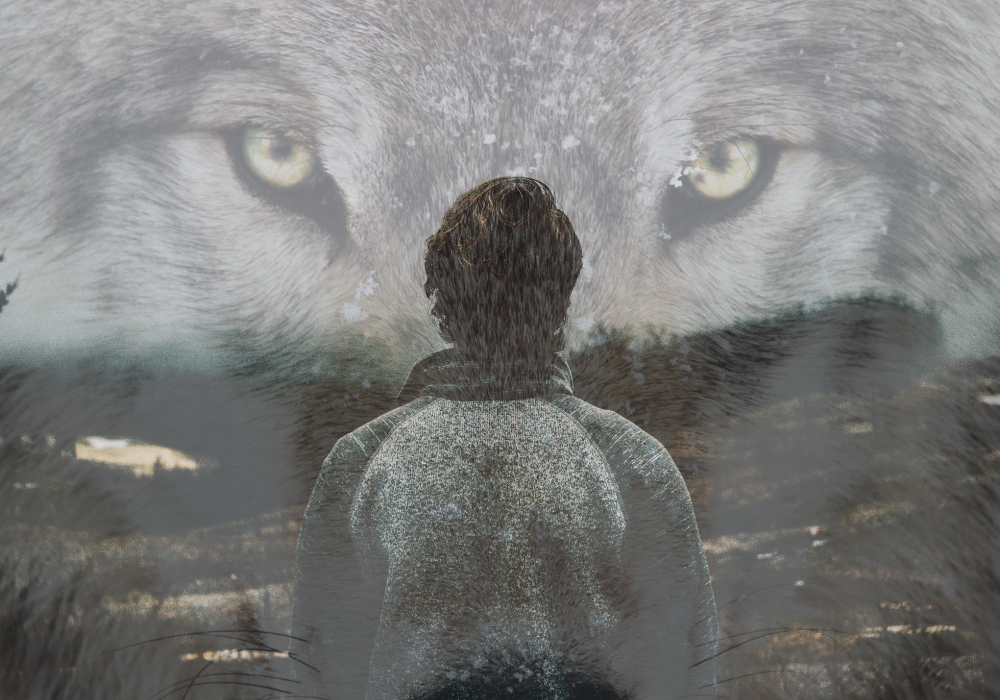Some people enjoy being alone. Others feel safest that way.
If you prefer independence, avoid emotional closeness, or feel drained by social expectations, you may identify with the lone wolf personality. But this trait isn’t always just about strength or confidence.
In many cases, a lone wolf personality forms as a response to past disappointment, emotional neglect, or the feeling that relying on others isn’t safe. Choosing solitude can feel empowering, but it can also become a form of emotional self-protection.
In this article, we’ll break down the 12 key traits of the lone wolf personality, the real reasons behind it, and the common myths that confuse independence with emotional isolation.
What is a Lone Wolf Personality?
A lone wolf personality means you like being alone and value your independence. People with this trait are often introverted, thoughtful, and very self-reliant. They enjoy their own company and don’t need to be around others all the time. Instead of following the crowd, lone wolves prefer to make their own decisions and trust their instincts.
Origins of the Term “Lone Wolf”:
The term “lone wolf personality” comes from the behavior of wolves that live and hunt alone, outside of their usual packs. It describes people who prefer solitude and self-reliance, showing independence and introversion. This metaphor, based on how wolves act in the wild, is used to refer to individuals who choose to operate independently rather than in groups.
The resource-> The Term ‘Lone Wolf’ and its Alternatives: Patterns of Public
and Academic Use from 2000 to 2020
Why Do People Become Lone Wolves?
Have you ever wondered why some people prefer to go through life on their own, keeping their distance from others and following their own path? It’s interesting to see why some develop a lone wolf personality, and there are several reasons for this behavior.
1-Past Trauma or Hurt:
One of the most common reasons people become lone wolves is because of past trauma or hurt. They may have experienced betrayal, rejection, or emotional pain in past relationships, making them build walls to avoid getting close to others. Being alone feels safer to them, protecting them from getting hurt again.
Related: How To Overcome Fear of Rejection ? 12 Effective Steps
Related: 23 Signs of Repressed Childhood Trauma in Adults

2-Feelings of Alienation:
People who feel different from most others, whether because of their interests, beliefs, or personal traits, may find it hard to connect. This sense of not fitting in can lead them to adopt a lone wolf personality.
3-Introverted Nature:
For some, being a lone wolf is just part of their introverted nature. Introverts recharge by spending time alone, away from social situations and large crowds. They find comfort in solitude, allowing them to reflect on their thoughts without distractions. Being alone helps them feel more at peace and in tune with themselves.
Related: 16 Signs of an Introvert + Types, Myths & Famous Lessons
Related: 10 Things That Happen When You Start to Enjoy Being Alone
Related: How to Living Alone: 12 Tips for a Smooth, Happy Transition
4-Fear of Vulnerability:
People with a lone wolf personality may isolate themselves to shield themselves from vulnerability. Forming close relationships requires emotional risk-taking, which can be scary for some.
They might fear being hurt or rejected if they let their guard down, so they choose to stay isolated to protect themselves. Being alone helps them avoid facing their fears and protects their emotional well-being.
5-The Desire for Independence:
Another main reason people choose to isolate themselves and become lone wolves is their desire for independence. They value their freedom and autonomy above all else, believing that being alone allows them to make decisions without any external influence. This independence gives them a sense of empowerment and control over their lives.
6-Personal Interests:
Lone wolves often have personal interests that need alone time. For example, Writers, artists, and researchers might need solitude to dive into their work. This quiet time helps them focus without distractions, boosting their creativity and productivity. Their strong focus on their passions makes them prefer being alone, as it gives them the space to explore and develop their ideas. This choice for solitude isn’t about avoiding people but about dedicating time to their craft and personal growth.
Related: How To Develop Your Personal Power ? 20 Tips
7-Lack of Trust:
People who develop a lone wolf personality may have a deep-seated lack of trust in others. They might have been let down or disappointed by friends or loved ones in the past, making it hard for them to open up and form meaningful connections. This lack of trust can lead them to retreat into their own world, where they feel safe from potential heartache or betrayal.
12 Traits of a Lone Wolf Personality:
The lone wolf personality is defined by several key traits that set these individuals apart from others. Understanding these traits can provide insight into their behavior and preferences.
1-They Preference Solitude:
One of the main traits of a lone wolf is their love for solitude. They feel comfortable and peaceful when alone, using this time to reflect, recharge, and enjoy personal interests. Unlike extroverts who gain energy from being around others, lone wolves often feel drained after socializing for too long and need alone time to recover. For lone wolves, spending time alone isn’t a burden; it’s essential for keeping their mental and emotional health in balance.
Related: How to Be Happy Alone: 20 Practical Tips to Embrace Solitude

2-They have a strong sense of identity:
Lone wolves have a strong sense of who they are and what they believe in. They are confident in their beliefs, values, and goals, and don’t need external validation. Lone wolves are not easily swayed by others’ opinions or peer pressure. They stay true to themselves, even if it means going against the flow. This strong sense of self allows them to navigate life authentically and honestly.
3-They are Deep Thinkers and Observers:
People with a lone wolf personality are often deep thinkers and keen observers. They spend a lot of time introspecting and analyzing their surroundings, making them highly perceptive and aware of their environment. This trait helps them develop a profound understanding of themselves and the world around them, often leading to unique and insightful perspectives.
4-They Risk-Taking:
Lone wolves are unafraid to take risks and step outside their comfort zones. They willingly challenge themselves and embrace new experiences, even if it means confronting their fears.
This bold approach to life allows them to grow and learn in ways that others might shy away from. Their willingness to take risks often leads to personal development and unique accomplishments.
5-They have a strong sense of Independence:
One of the key traits of a lone wolf personality is fierce independence. They are self-reliant and prefer to make decisions on their own, without seeking approval or input from others. Independence is a key value for lone wolves. They trust their judgment and abilities to handle life’s challenges. Lone wolves are proud of being self-sufficient and don’t often look for approval from others. They rely on their instincts and make decisions based on their convictions. This strong sense of independence allows them to forge their own path and pursue their goals without needing constant support or guidance.
6-They Have a Quiet and Private Nature:
Lone wolves are generally more reserved and private than their extroverted counterparts. They place a high value on personal space and boundaries, often preferring to keep their thoughts and feelings to themselves. Because of this, a lone wolf may be cautious about letting others into their inner circle. This reserved nature helps them maintain control and comfort in their interactions.
7-They Are Self-Sufficient:
People with a lone wolf personality are highly self-sufficient and capable of managing on their own. They trust their abilities and instincts to handle life’s challenges. Lone wolves don’t rely on others for constant support or validation. Instead, they use their skills and confidence to tackle problems and overcome obstacles, facing difficulties with resilience and adaptability.
8-They Prefer Quality Friendships with Space:
Lone wolves like to have a few close friends instead of a large group. They focus on quality over quantity, putting their time and energy into meaningful relationships. Even with their closest friends, they keep some distance. They value their personal space and enjoy solitude, so they don’t need constant interaction. While they care about their friends, they set boundaries to protect their own well-being.
9-They Select Social Interactions:
They aren’t antisocial; they just choose their social interactions carefully. They prioritize forming meaningful and substantial connections with others over participating in large social gatherings.
10-They’re not swayed by the crowd:
Lone wolves don’t conform just to fit in; they hold their ground, even if it means standing alone. Driven by their values, beliefs, and personal judgment rather than popular opinion or social pressure, they often take the road less traveled. This tendency to follow their own path is a clear sign of their lone wolf spirit.
11-They are Creative:
People with lone wolf personalities are often very creative. They do their best work when they have the freedom to explore their own ideas. They find inspiration and get productive when they are on their own, without interruptions or outside pressure. This helps them create unique and original work.
12-They build strong and deep relationships:
Lone wolves can be very empathetic. Their time spent reflecting on their feelings helps them better understand and connect with others. This self-awareness makes them great friends and listeners. Even though they enjoy being alone, they still build strong and meaningful relationships with people.
5 Myths and Misconceptions about Lone Wolves People:
1-Lone Wolves Are Social Outcasts:
A common myth about lone wolves is that they are social outcasts who can’t form meaningful connections with others. This isn’t true at all! While lone wolves may prefer solitude, it doesn’t mean they can’t build deep and lasting relationships. Many lone wolves have strong friendships and family bonds; they just like spending time alone to recharge and reflect.
2-Lone Wolves Are Lonely:
Another myth about people with a lone wolf personality is that they are always lonely and unhappy. Even though they enjoy spending time alone, it doesn’t mean they feel sad or isolated. Many lone wolves actually find their solitude refreshing and inspiring. They like their own company and find peace in quiet moments of reflection.
3-Lone Wolves Are Depressed:
People with a lone wolf personality are depressed or have social anxiety. While some lone wolves might face mental health challenges, it’s important to remember that not all of them do. Many lone wolves are quite happy and feel fulfilled by their independence. It’s important not to assume someone’s mental health based on their preference for solitude.
Related: Understanding The 8 Different Types of Depression
4-They Cannot Work in Teams:
A common misconception is that lone wolves can’t work well in teams. Many lone wolves can collaborate effectively, especially when everyone’s roles and tasks are clearly set out. They often bring valuable skills and ideas to the team and can work well with others when they have the space to focus on their contributions.
One of the biggest myths about lone wolves is that they are antisocial and uninterested in social interactions. In reality, many lone wolves are quite social but prefer to socialize on their own terms. They might enjoy smaller gatherings or one-on-one conversations more than large, noisy parties. It’s important to remember that being introverted or liking solitude doesn’t mean someone is antisocial.
Related: How to Speak Well in 15 Easy Steps ?
Conclusion:
Having a lone wolf personality isn’t a flaw or disadvantage; it’s just a different way of finding happiness and navigating life. People with this personality thrive on their own and are determined to follow their passions. They might struggle with fitting into typical social settings, but their independence is a real strength.
Being a lone wolf doesn’t mean you cut yourself off from everyone. It’s about understanding your own needs and choosing a life that suits you. Embrace your lone wolf personality and be proud of creating your own path. In a world that values self-sufficiency, your unique approach is a real asset.
“Being a lone wolf doesn’t mean being alone; it means choosing your path with courage and confidence.” — Unknown
Frequently Asked Questions About Lone Wolf Personality
-
Is being a lone wolf a mental disorder?
No, being a lone wolf is not a mental disorder. It’s a personality trait characterized by preference for solitude and independence. While some people may isolate due to mental health conditions, many healthy, well-adjusted individuals simply thrive better alone and choose this lifestyle intentionally.
-
Can lone wolves be in successful relationships?
Absolutely. Lone wolves can have deep, meaningful relationships. They typically prefer fewer, higher-quality connections and value partners who respect their need for space and independence. Their self-awareness and empathy often make them exceptionally loyal and understanding partners.
-
What’s the difference between a lone wolf and someone who’s lonely?
The key difference is choice and fulfillment. A lone wolf chooses solitude and finds it energizing and satisfying. Someone who’s lonely feels isolated against their will and desires more social connection than they have. Lone wolves enjoy their own company; lonely people crave others’ company.
-
Are lone wolves good leaders?
Yes, many lone wolves make excellent leaders. Their independence, clear thinking, and resistance to groupthink allow them to make bold, unbiased decisions. They often lead through vision and competence rather than seeking popularity, which can be highly effective in the right environments.
-
Do lone wolves ever get lonely?
Occasionally, like all humans, but it’s not their default state. Lone wolves are comfortable with solitude and don’t depend on social interaction for happiness. They may experience loneliness during major life transitions, but they typically have strong coping mechanisms and return to enjoying their own company.









Hey people!!!!!
Good mood and good luck to everyone!!!!!
Is society’s obsession with extroversion and social conformity holding back the potential of lone wolves to thrive and contribute their unique perspectives to the world?”,
“refusal